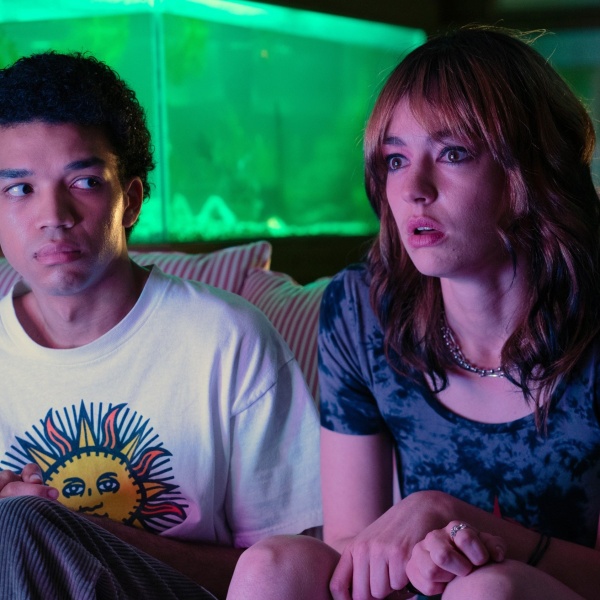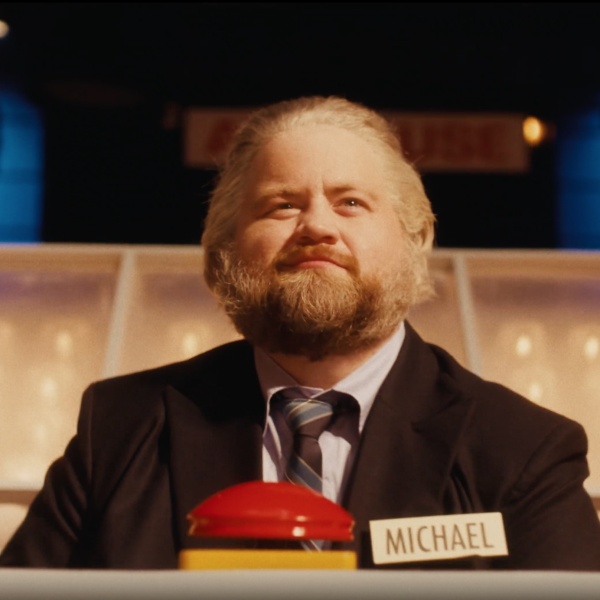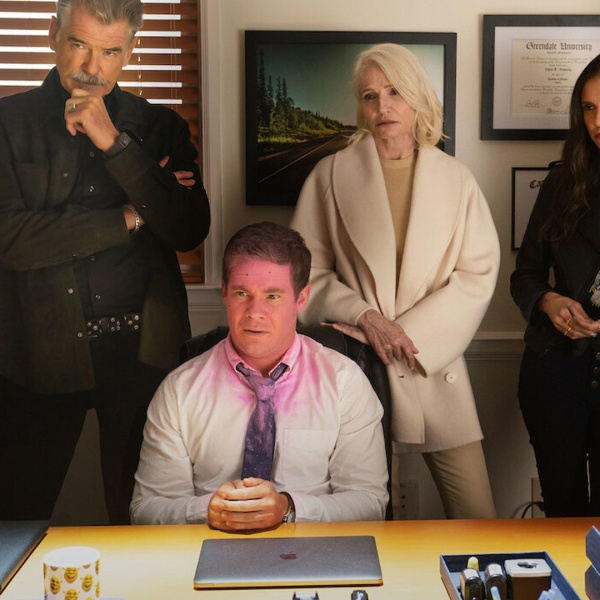
In this week’s “Another Earth,” rising star Brit Marling plays Rhoda, a troubled young woman who is released from prison after serving a sentence for a fatal drunk driving incident. She eventually comes into the life of the grieving father John (William Mapother) whose child she killed all while the rest of the world deals with a mirror version of Earth appearing in the sky, hidden behind the Sun. Marling, who co-wrote the film with director Mike Cahill, has become a major personality in the indie film world with both “Another Earth” and “Sound Of My Voice” (also co-written by, and starring Marling) surprising both the arthouse and genre fans as they’ve done the festival rounds. “Another Earth” walked away from Sundance this year with a distribution deal with Fox Searchlight and two prizes for director Mike Cahill.
As for Marling, the buzz has landed her a role in the finance world drama “Arbitrage” with Richard Gere and Susan Sarandon, as well as a re-teaming with ‘Voice’ director Zal Batmanglij in “The East.” So definitely lots on the horizon for the actress, but for now, we sat down with the talented multi-hyphenate and discussed the science, heartbreak and collaborations that take viewers to “Another Earth.”
The Playlist: How did your collaboration with Mike Cahill come to be? And what gave you the idea to foreground this tragedy amidst a fantastical science fiction story?
Brit Marling: I think the way that it came about is that we were just talking a lot, and we would meet frequently. We were best friends, so we would share a lot of stories about our personal lives. And I think at the time Mike was listening to a lot of Dr. Richard Berenson on tape, so I would come over to his apartment and he would just be lying on the floor, and Berenson’s voice would just be booming through the speakers. And his voice sounds like the voice of the universe. It just got us daydreaming. In the cities you’re really disconnected from the cosmos. It used to be that you would go to sleep under the stars, and you had a relationship with the universe. And now it’s like, you’re in the city, you’re in an apartment, all the lights make it impossible to see. Your proper insignificance is lost. I think we were talking a lot about these ideas and the stories came out.

And that plays into the isolation of John’s house in the film.
The idea for John is that he’s become an outcast, and she has become an outcast too. They have both become outsiders, and nobody else speaks their language, and they found that in each other. I think grief, tragedy, you can recognize that in someone else, and I think that kind of draws them out of their isolation. And they create this happy bubble that’s oblivious to anything, including their past, which is just not discussed.
Because you and Mike worked so closely on this project, was there ever any influence you had on the directing process?
No. As a writer we have a collaborative process together. And we crack the story, and then that phase is over. When you come to set, Mike is so good at what he does. I think you see this a lot in young filmmakers. There’s a difference, and you feel some directors who have to be cocky and have this bravado, and others they just have this confidence because they’re coming from a real place. And Mike has that genuine confidence of an artist who has something to say. The great part is, I come to set, where he’s the director and I’m the actress. As the actress, you have to be willing to surrender, because if you don’t, the stuff can’t come out, so you have to trust your director, and feel safe, that he’s protecting you, so you can do that deep sea diving work so you can do something real and authentic. And I trust Mike so thoroughly that he makes it much easier to do my job as an actor.
Are you familiar with “Melancholia” also having the same plot development, the discovery of a new Earth?
It’s weird, right? “Melancholia” is dealing with a new planet, we’re dealing with a new planet. I don’t know if it doesn’t come from people developing anxiety over running out of resources. Like, we’ll need another one, we’re destroying this one, so we’re starting to dream of another planet to inhabit or something. I don’t know where it would be coming from culturally, but I feel like it’s on people’s minds. Maybe that’s why peoples’ responses to this movie are so primal.
How did you manage to balance this science-fiction aspect with the real world grounding of the main story? And do you feel that adding that layer of the galactic added gravity to your main premise?
I think that because the premise is fantastical that rooting parts of it in reality, whether it’s pieces of the science, like Brian Greene’s multiverse theory, or the idea of superior conjunction, something being behind the Sun. You’re taking part of science that are real and sticking those tacks in the ground. And I think you’re doing the same with the human drama, and it sort of lets this fantastical tale take on wind. It’s like, something is tethered to the ground. I think that was very important to Mike. He talked in the very beginning that it was very important to him that you feel a gritty sort of realism so you could connect to these characters.
Was there ever the idea to place this conceit of another planet in Rhoda’s head, as if she’s created this science fiction concept as a coping mechanism?
There were points Mike and I talked about that. Like, is this just her fantasy post-locked up in prison? Like a literal escapist fantasy. But we never did that because it was more interesting to push that concept there, to push the audience’s willingness to believe in something impossible. But everything’s impossible. People used to think the world was flat. People used to think the Earth was the center of the universe. People were burned at the stake. The same thing is happening now, we just don’t know what these things are.
Science is what it is, until it’s proven wrong.
That’s why, when we read Brian Greene’s work, he said, ‘A lot of this is very… look, there is a finite number of particles in the universe. If you shuffle those cards repeatedly, you’re bound to repeat something. Which means, multiple universes aren’t just possible, they’re likely.’ And that seems like such a huge thing to wrap our minds around, but we do it.
The story stays fairly grounded, and we only get a brief hint at how the rest of the world is reacting to this seismic change in scientific thought. Was there ever the inclination to feature more fantastical elements, or to further illustrate the science behind this other world?
There were so many things we thought about, that we never went through with it. We daydreamed a lot about the society and what would happen. That, say, at some point the two Earths would reach an alignment that gravity would be suspended. And Rhoda would be walking through, and the falling blossoms and leaves would just stay still. We thought about how animals were affected. How would it change their communication, their sense of behavior? Everything happening with the sci-fi story is just a way of drawing out what these characters are going through.
The more you researched about the science of this story, was it then easier or more difficult to sort out the emotional fallout from what happens?
I think science is a great approach and filmmaking is a great approach. Films allow you, more than some other art forms, to get at the ineffable. Like, you are always speaking about part of a whole. The script writing, you’re using one scene to illustrate their entire relationship, one gesture to communicate who this character is. And you don’t get to expand for pages like you do in a novel. Something about filmmaking lets you approach the metaphysical, because you’re just taking pieces, and so much is left to the blank space, which is what the audience feels. And I think that’s why these open endings are so popular, there are no answers. You said this so well, that science is what it is, until it’s proven wrong. You merge science and filmmaking and you have a very effective probe for dissecting everything around you.
“Another Open” opens on Friday, July 22nd.


